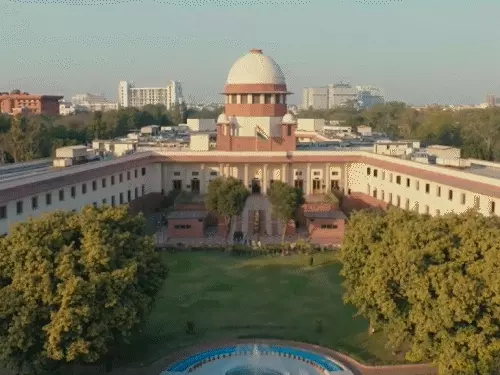New Delhi, April 17: The Supreme Court on Thursday recorded the undertaking given by the Union government that no fresh members would be appointed to waqf boards and the Central Waqf Council in terms of the Waqf (Amendment) Act, 2025 till the next date of hearing. In its interim order, a bench headed by CJI Sanjiv recorded the assurance given by Solicitor General Tushar Mehta that the status of existing waqfs, including waqf by user, will not be changed or identified.
The Bench, also comprising Justices Sanjay Kumar and K.V. Viswanathan, asked the Centre to file its reply to the petitions seeking stay and challenging the validity of the recent amendments introduced to the Waqf Act, 1995, within a period of seven days. In view of the multiplicity of the petitions, the apex court told the petitioners to choose five lead pleas to be decided by the apex court, adding that the other petitions may be treated as applications or deemed to be disposed of.
The apex court directed its registry to rename the matter as “In Re: Waqf Amendment Act”. It also ordered the appointment of nodal counsel to facilitate the filing of pleadings and written submissions before the apex court. The matter is likely to be listed next on May 5 for further hearing. On Wednesday, the CJI Khanna-led Bench indicated that it would pass an interim order but deferred the proceedings after SG Mehta urged that the Union government should be given a hearing before any interim order is passed.
Multiple petitions have been filed before the Supreme Court challenging the constitutional validity of the recent amendments introduced in the Waqf Act, 1995. After the legislation was passed by Parliament in the first week of April, the Congress announced it will challenge the Waqf (Amendment) Bill (now an Act after the Presidential assent) before the Supreme Court, claiming that it was an attack on the basic structure of the Constitution and was aimed at “polarising” and “dividing” the country on the basis of religion.
On the other hand, the government said that crores of poor Muslims will benefit from this legislation, and in no way does it harm any single Muslim. In his petition filed before the apex court, Congress MP and party whip in Lok Sabha Mohammad Jawed contended that the amendments violated Articles 14 (right to equality), 25 (freedom to practice and propagate religion), 26 (freedom of religious denominations to manage their religious affairs), 29 (minority rights), and 300A (right to property) of the Constitution. Another plea filed by All India Majlis-e-Ittehadul Muslimeen (AIMIM) chief Asaduddin Owaisi said the impugned amendments are “ex facie violative of Articles 14, 15, 21, 25, 26, 29, 30, 300A of the Constitution of India and manifestly arbitrary”.
Several others, including the Association for Protection of Civil Rights, AAP leader Amanatullah Khan, Maulana Arshad Madani of Jamiat Ulema-i-Hind, the All India Muslim Personal Law Board (AIMPLB), the Social Democratic Party of India (SDPI), the Indian Union Muslim League, Taiyyab Khan Salmani, and Anjum Kadari, have filed petitions challenging the constitutional validity of the provision.
In response to the petitions seeking a stay on the implementation of the Waqf (Amendment) Act, 2025, the Union government haf filed a caveat, or notice submitted to a court by a party to a litigation who wishes to be heard before any order is likely to be issued on the opponent’s plea, in the Supreme Court.
Also, several BJP-ruled states, including Haryana, Maharashtra, Madhya Pradesh, Rajasthan, Chhattisgarh, Assam, and Uttarakhand, have approached the Supreme Court seeking to defend the Waqf (Amendment) Act, 2025. The concept of ‘Waqf’, rooted in Islamic laws and traditions, refers to an endowment made by a Muslim for charitable or religious purposes, such as mosques, schools, hospitals, or other public institutions.
